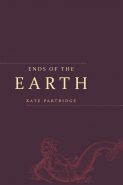
Review: Ends of the Earth by Kate Partridge
Reviewed by Doug Ramspeck

Ends of the Earth
Poetry by Kate Partridge
University of Alaska Press, 2017
$14.95, 70 pp.
ISBN-13: 978-1602233324
My younger college students sometimes seem dismayed that contemporary poetry doesn’t sound like Wordsworth or Shakespeare. They are puzzled by the diversity of voices, by the range of formats and aesthetic approaches, and by the shifts between the “poetic,” the conversational, and the various postmodern modes of expression.
What is notable about Kate Partridge’s Ends of the Earth is how rapidly the author herself jumps between disparate voices within a single collection, often within a single poem. In “Bell,” for example:
The man downstairs begins singing
Springsteen at six, as the one upstairs
sings prayers until interrupted
by the one of us who has not yet
adopted a practice: the baby,
who experiments boldly with volume,
timbre, and timing before
she finds a note that suits her
and cradles it with a full tongue.
The next stanza, however, launches in an associative way to a new and more formal voice, with the accompanying expansion of line:
The length of a human baby’s vocal chords is two to three millimeters. Babies
vibrate them very hard—harder than an adult could without injuring her-
self—to produce a grating sound, designed like the roar of a lion to generate
response.
This move between the personal and the scientific is common in the book, as are swings in geography and history. This approach asks us, as readers, to appreciate how to understand any one thing requires that we first understand everything else.
Some preoccupations of the book are Gilamesh and Siduri, Alaska, phrenology, and Walt Whitman. That last one in particular seems central to the collection. While Whitman casts his discursive line to capture the largeness of America, Partridge sets her sights on those “ends of the earths” the title references.
In the best of the poems, like “Concussion,” the personal and the scientific and the historical and the geographic merge into a dizzying dream of human expression:
Medical and Physical Journal (1803):
The term conveys not
a precise idea of the derangement
produced in the organization
of the brain by extended violence
Then later:
One night I woke on the bus to the
impact of a deer on the front bumper
and watched as its body spun into
the dark median.
Such joinings make for thoughtful and engaging poems that spread out across the large canvas of experience. And the fact that Partridge and other poets are expanding our sense of the poetic is surely a good thing, and one I hope my students will learn to celebrate.
Doug Ramspeck is the author of six poetry collections and one collection of short stories. His most recent book, Black Flowers, is forthcoming by LSU Press. Individual poems have appeared in journals that include The Kenyon Review, The Southern Review, Slate, and The Georgia Review. His short story collection, The Owl That Carries Us Away, is published by BkMk Press (University of Missouri-Kansas City).

Leave a Reply